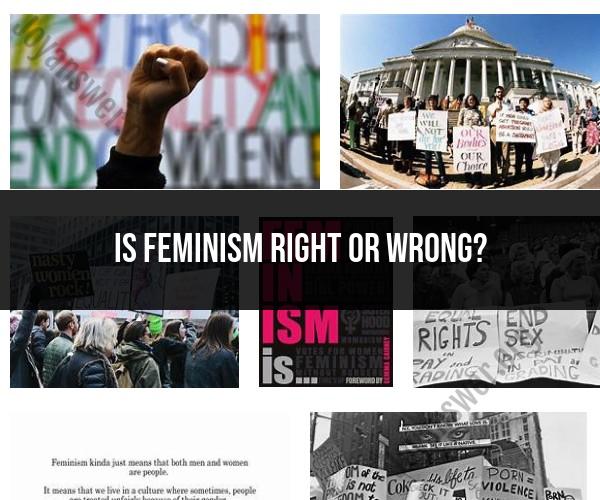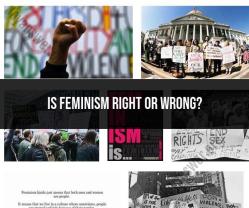Is feminism right or wrong?
The question of whether feminism is "right" or "wrong" is subjective and depends on one's perspective and beliefs. Feminism is a broad and multifaceted movement that encompasses a range of ideologies, goals, and strategies. It advocates for gender equality and addresses issues related to the rights, opportunities, and treatment of women and marginalized gender groups.
Opinions about feminism vary widely, and there are both supporters and critics of the movement. Here are some perspectives and debates related to feminism:
Supporters of Feminism argue:
Gender Equality: Feminism is seen as a crucial movement that seeks to rectify historical and ongoing gender-based inequalities, advocating for equal rights and opportunities for all genders.
Social Justice: Feminism is often framed as a social justice movement that challenges systems of power, oppression, and discrimination based on gender, race, class, and other factors.
Empowerment: Many supporters believe that feminism empowers individuals by promoting self-determination and autonomy over one's body, choices, and life.
Intersectionality: Contemporary feminism emphasizes intersectionality, recognizing that gender intersects with other aspects of identity (e.g., race, class, sexuality) and that the movement should address the unique experiences of individuals at these intersections.
Critics of Feminism argue:
Anti-Men: Some critics believe that feminism is anti-men or promotes a negative view of all men. They argue that it alienates and vilifies men rather than promoting cooperation and understanding between genders.
Exaggeration of Issues: Some critics contend that feminism exaggerates or overstates the extent of gender-based discrimination in modern society, suggesting that progress has been made and that feminism is no longer necessary.
Political Agendas: Critics may argue that feminism has been co-opted by political agendas, leading to ideological polarization and division rather than meaningful progress on gender equality.
Victimhood Culture: A perspective exists that some forms of feminism promote a "victimhood culture," encouraging individuals to see themselves as victims and discouraging personal responsibility.
Different Approaches: Critics often argue that there is no single feminism but rather a diversity of feminist ideologies and approaches. They may have disagreements with certain branches or aspects of feminism while acknowledging the validity of others.
It's important to recognize that feminism is not a monolithic movement, and there are different schools of thought within feminism itself. People may align with some aspects of feminism while disagreeing with others. The perception of whether feminism is "right" or "wrong" is influenced by individual beliefs, experiences, and perspectives.
Debates about feminism are ongoing, and they contribute to a broader discussion about gender equality, social justice, and the evolving roles and expectations of individuals in society. Ultimately, the assessment of feminism's impact and value is subjective and can vary widely among individuals and communities.




